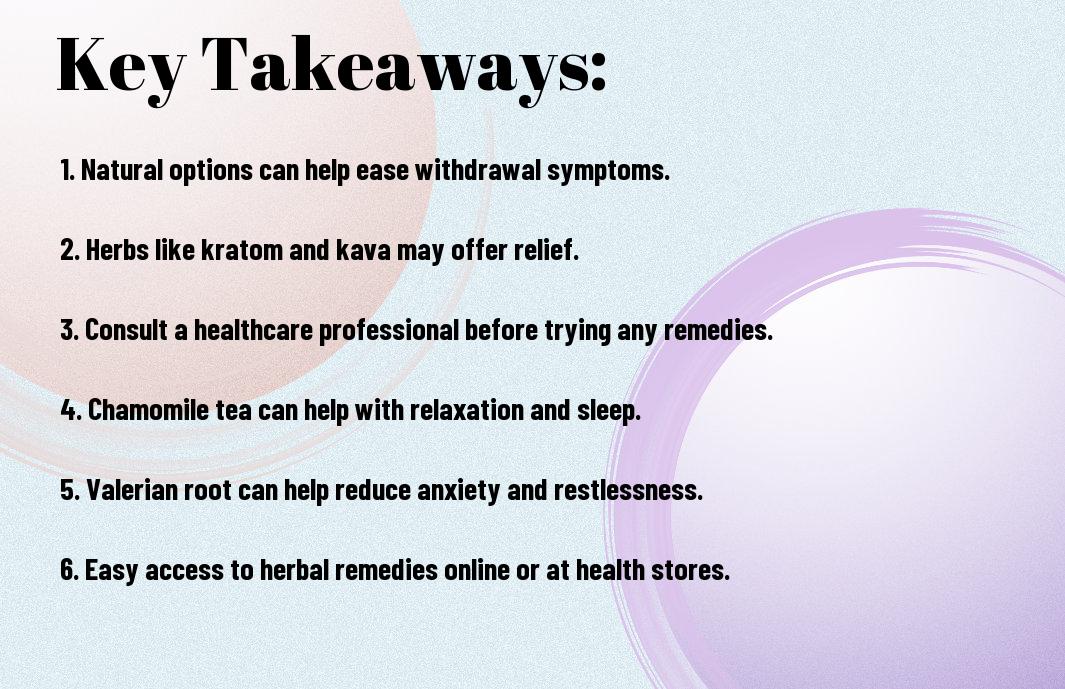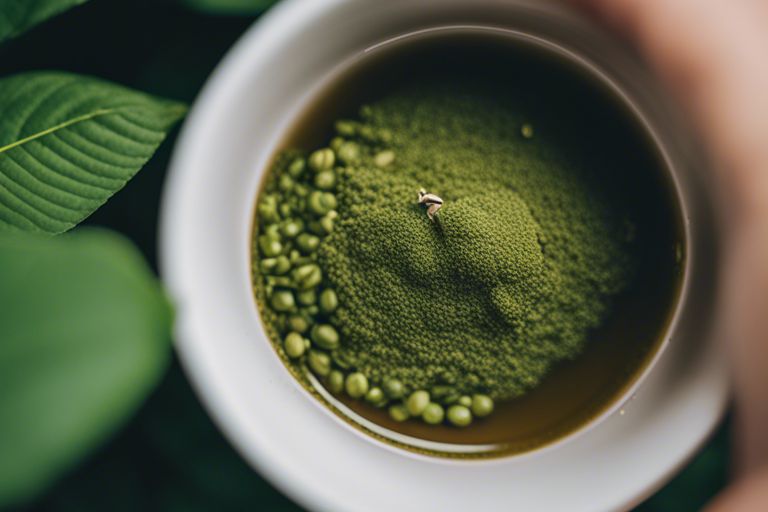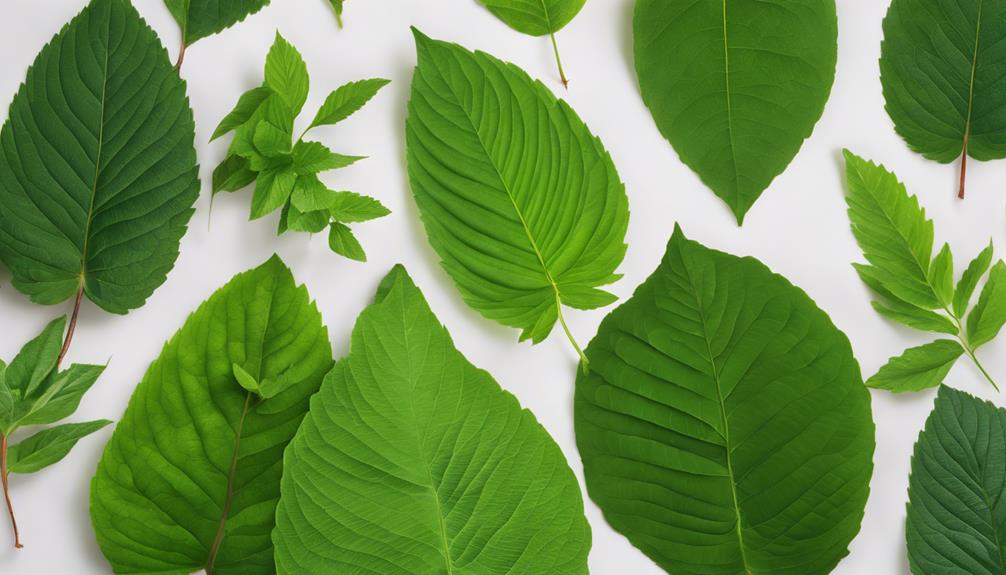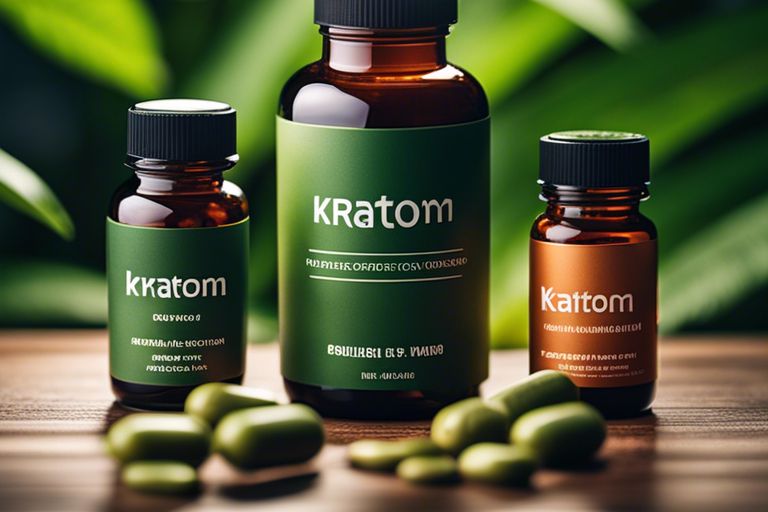Most individuals struggling with opiate withdrawal symptoms seek relief through natural remedies. If you’re looking for a holistic approach to ease the discomfort and cravings during this challenging time, herbal remedies can be a gentle and effective way to support your body’s healing process. In this article, we will explore some herbs that have been traditionally used to alleviate opiate withdrawal symptoms and promote overall well-being.

The Opiate Epidemic
Before delving into herbal remedies for opiate withdrawal, it’s crucial to understand the context of the opiate epidemic that has been devastating communities across the country. The misuse and addiction to opiates, including prescription pain relievers, heroin, and synthetic opioids like fentanyl, has reached unprecedented levels, causing a public health crisis.
Rise of Opiate Addiction
One of the main factors contributing to the rise in opiate addiction is the overprescription of opioid medications for pain management. What starts as a legitimate medical treatment for pain can quickly spiral into addiction as the body develops a tolerance to the medication, requiring higher doses to achieve the same relief.
Conventional Treatment Options
Epidemic levels of opiate addiction have led to a reliance on conventional treatment options such as opioid replacement therapies like methadone and buprenorphine. While these treatments can be effective in managing withdrawal symptoms and reducing cravings, they come with their own set of risks and side effects.
Plus, these conventional treatments may not be accessible to everyone due to financial constraints, lack of healthcare coverage, or personal beliefs. In such cases, exploring alternative approaches like herbal remedies for opiate withdrawal can be a game-changer in your journey towards recovery.
Herbal Remedies for Withdrawal
Historical Use of Herbs in Detoxification
To understand the power of herbal remedies in easing opiate withdrawal symptoms, look back at history. For centuries, traditional healers across various cultures have relied on the natural healing properties of certain herbs to assist in detoxification processes. These herbs have been used to support the body in eliminating toxins, promoting overall health and well-being.
Mechanisms of Action
To explore into how herbal remedies work in alleviating opiate withdrawal symptoms, it’s important to explore their mechanisms of action. Some herbs help by calming the nervous system and reducing anxiety, which can be beneficial during the stressful period of withdrawal. Others may support liver function and aid in the elimination of toxins from the body, assisting in the detoxification process.
For a deeper understanding, think of these herbal remedies as allies working alongside your body’s natural mechanisms to restore balance and promote healing. By incorporating these herbs into your regimen, you may experience a smoother transition during the withdrawal period.
Herbal
Your journey towards overcoming opiate withdrawal can be supported by the use of herbal remedies. These natural tools can help ease your symptoms and promote a sense of well-being as your body adjusts to the absence of opiates. Consider incorporating herbal remedies into your detoxification plan to enhance your overall success in overcoming opiate dependency.
Top Herbal Remedies for Opiate Withdrawal
Kratom (Mitragyna speciosa)
With its origins in Southeast Asia, Kratom has gained popularity for its potential to help manage opiate withdrawal symptoms. The active compounds in Kratom, such as mitragynine, interact with opioid receptors in the brain, providing relief from cravings, anxiety, and pain associated with opiate withdrawal. You can find Kratom in various forms like powder, capsules, or extracts, but it’s important to use it cautiously and consult a healthcare provider for guidance on dosage and safety.
Kava (Piper methysticum)
Piper
It’s important to note that Kava is known for its calming effects and has been traditionally used in the Pacific Islands to reduce anxiety and promote relaxation. Kava works by affecting the neurotransmitters in the brain, which can help alleviate symptoms of anxiety and restlessness during opiate withdrawal. Kava can be consumed as a tea or in supplement form, but it’s advisable to consult a healthcare professional before using it, as prolonged or excessive use may have adverse effects on the liver.
The traditional use of Kava in ceremonies and social gatherings highlights its significance in promoting a sense of calm and well-being. However, due to its potential liver toxicity, it’s crucial to use Kava sparingly and under the guidance of a qualified healthcare provider.
Passionflower (Passiflora incarnata)
Piper
The use of Passionflower for managing anxiety and insomnia makes it a valuable option during opiate withdrawal. Passionflower contains compounds that have a calming effect on the central nervous system, helping to alleviate symptoms like restlessness, agitation, and insomnia that often accompany opiate withdrawal. You can consume Passionflower as a tea, tincture, or supplement, but it’s recommended to seek advice from a healthcare professional for the appropriate dosage.
The gentle sedative properties of Passionflower can aid in relaxation and promote a sense of tranquility, making it a natural remedy worth considering for managing opiate withdrawal symptoms.
Valerian Root (Valeriana officinalis)
With its long history of use as a natural sedative, Valerian Root is a popular choice for managing sleep disturbances and anxiety during opiate withdrawal. Valerian Root contains compounds that interact with the GABA receptors in the brain, promoting relaxation and improving sleep quality. You can consume Valerian Root as a tea, tincture, or in capsule form, but it’s advisable to consult a healthcare provider to determine the proper dosage for your specific needs.
Valerian Root’s effectiveness in promoting relaxation and reducing anxiety can be beneficial in alleviating the psychological and physical symptoms of opiate withdrawal, making it a valuable herbal remedy to incorporate into your recovery plan.
Skullcap (Scutellaria lateriflora)
To
The traditional use of Skullcap as a nervine tonic and mild sedative makes it a promising herbal remedy for managing anxiety and restlessness during opiate withdrawal. Skullcap contains active compounds that have calming effects on the nervous system, helping to reduce agitation, muscle tension, and insomnia. You can consume Skullcap as a tea, tincture, or supplement, but it’s important to seek guidance from a healthcare provider to ensure safe and effective use.
How Herbal Remedies Work
Reducing Withdrawal Symptoms
To reduce withdrawal symptoms, herbal remedies work by targeting the areas of your body that are most affected during withdrawal. By using herbs known for their calming and soothing properties, you can help alleviate the physical discomfort you may experience when coming off opiates.
Managing Anxiety and Depression
To manage anxiety and depression during opiate withdrawal, herbal remedies can be effective in promoting a sense of calm and well-being. Certain herbs have natural properties that help to balance mood and reduce feelings of anxiety and depression.
In addition to helping with anxiety and depression, some herbal remedies can also provide a boost of energy and mental clarity, making it easier for you to navigate the challenges of the withdrawal process.
Promoting Relaxation and Sleep
Symptoms of restlessness and insomnia are common during opiate withdrawal. Herbal remedies can help promote relaxation and improve sleep quality through their sedative effects. By calming the nervous system and inducing a state of relaxation, these remedies can help you get the rest you need during this challenging time.
Relaxation is key to aiding the body in its healing process during opiate withdrawal. By incorporating herbal remedies that promote relaxation, you can support your body in recovering from the effects of opiates and rebalancing itself naturally.
Precautions and Contraindications
All herbal remedies should be used with caution, especially if you are taking any medications. Some herbs can interact with certain drugs, either reducing their effectiveness or causing unwanted side effects. It is crucial to consult with a healthcare provider or a professional herbalist before incorporating any new herbs into your routine.
Interactions with Medications
The herbal remedy you are considering for opiate withdrawal may interact with medications you are currently taking. Some herbs can interfere with the way drugs are metabolized in your body, leading to potentially harmful outcomes. For example, St. John’s Wort is known to interact with various medications, including antidepressants, birth control pills, and blood thinners. Therefore, always disclose all herbs and medications you are using to your healthcare provider to avoid any adverse reactions.
Potential Side Effects
With any herbal remedy, there is a possibility of experiencing side effects. While natural, herbs can still trigger reactions in some individuals. Common side effects of certain herbs used for opiate withdrawal may include gastrointestinal disturbances, dizziness, or allergic reactions. It is imperative to start with a low dose and monitor your body’s response carefully. If you notice any unusual symptoms, discontinue use and seek medical advice.
This subsection provides information on potential side effects that you may experience when using herbal remedies for opiate withdrawal. It is important to be aware of these possibilities and proceed with caution. Always listen to your body and prioritize your health and well-being above all else.
Pregnancy and Breastfeeding
One crucial consideration when using herbal remedies is their safety during pregnancy and breastfeeding. Certain herbs can have uterine stimulant effects or pass through breast milk, potentially impacting the baby. If you are pregnant or nursing, it is imperative to consult with a healthcare provider before using any herbal remedies for opiate withdrawal. They can provide guidance on what is safe for you and your baby’s health.
With the potential risks associated with herbal remedies during pregnancy and breastfeeding, it is crucial to exercise caution. Some herbs can cross the placental barrier or transfer into breast milk, affecting the developing fetus or infant. Prioritize safety and always seek professional advice before using any herbal remedies during this sensitive time.

Combining Herbal Remedies with Conventional Treatment
Integrative Approach to Detoxification
After starting your herbal remedy for opiate withdrawal, you can consider an integrative approach to detoxification. This method involves combining herbal remedies with conventional medical treatments to help manage withdrawal symptoms effectively. By working with both natural and pharmaceutical options, you can optimize your detox process and support your overall well-being.
Working with Healthcare Professionals
Approach your healthcare professionals to discuss integrating herbal remedies into your opiate withdrawal treatment plan. By collaborating with your doctors and specialists, you can ensure that the herbal remedies you choose are safe and compatible with any prescribed medications or treatments. Your healthcare team can provide valuable insight and guidance on how to best combine herbal remedies with conventional care.
To make the most of your collaboration with healthcare professionals, be open and honest about your herbal remedy use. Inform your doctors about the specific herbs you are taking, their dosages, and any observed effects. This information will help your healthcare team tailor their treatment recommendations to support your detox journey effectively.
Conclusion
Summing up, herbal remedies can be a valuable tool in managing symptoms of opiate withdrawal. While they may not completely eliminate all withdrawal symptoms, they can help ease discomfort and support your body during the detox process. Remember to consult with a healthcare provider before starting any herbal remedy regimen, especially if you are currently taking other medications or have underlying health conditions.
Overall, incorporating herbal remedies into your opiate withdrawal plan can be a holistic approach to supporting your recovery. By combining natural remedies with other supportive measures such as therapy and mindfulness practices, you can increase your chances of successfully transitioning off opiates and improving your overall well-being.
Q: What is opiate withdrawal?
A: Opiate withdrawal refers to the physical and psychological symptoms that occur when someone reduces or stops their use of opioids after a period of prolonged use.
Q: Can herbal remedies help with opiate withdrawal?
A: Yes, some herbal remedies have been used to alleviate the symptoms of opiate withdrawal and support the body during the detox process.
Q: What are some commonly used herbal remedies for opiate withdrawal?
A: Some commonly used herbal remedies for opiate withdrawal include kratom, passionflower, valerian root, and kava kava.
Q: Are herbal remedies safe to use for opiate withdrawal?
A: While herbal remedies are generally considered safe, it is important to consult with a healthcare provider before using them, especially if you are taking any medications or have underlying health conditions.
Q: How do herbal remedies help with opiate withdrawal?
A: Herbal remedies can help with opiate withdrawal by reducing anxiety, improving sleep, managing pain, and supporting overall physical and mental well-being during the detox process.
Q: Are there any potential risks or side effects associated with using herbal remedies for opiate withdrawal?
A: Some herbal remedies may have potential risks and side effects, such as allergic reactions, interactions with medications, or adverse effects on certain health conditions. It is important to use them cautiously and under the guidance of a healthcare provider.
Q: Can herbal remedies be used as a standalone treatment for opiate withdrawal?
A: Herbal remedies can be used as a complementary approach to traditional treatments for opiate withdrawal, but they may not be sufficient as standalone treatments. It is important to seek comprehensive care and support for opiate withdrawal, which may include medical supervision, counseling, and other interventions.









